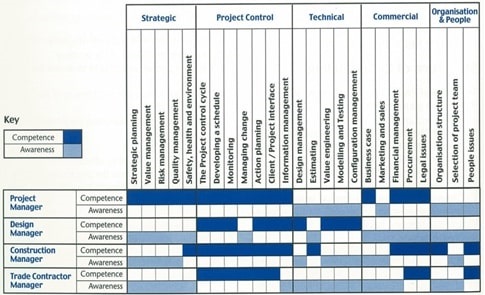Traits and Skills Required by Project Managers to Complete Construction Projects in Guyana's Civil Engineering Firms

Abstract:
This paper will highlight the important
features of Project Management Traits and Skills and identify the most effective
skill set to produce a successful Construction Project. The paper is laid out with
a general introduction of the key concepts of Project Management, specifically Construction
Project Management, it then examines the crucial traits, skills, and characteristics
and determines based on research of works completed as to the combination that is
most likely to achieve project success. It was established that Interpersonal skills,
leadership, effective communication, and prompt technical skills were likely to
produce the most successful project. The purpose of the research study is to place,
in the research linguistics, the methods and instruments to be used in the research
model, from the location of the type of study and the design of the research; its
world or population; its samples; and the instruments and techniques of data collection.
The techniques used in this study will be based on the literature, review of standards
of traits and skills, studies, and research undertaken previously, which will allow
to gather the information needed to make findings and conclusions and develop the
Risk Management Plan. The result was identifying traits and skills needed by Project
Managers to compete and complete construction projects and how project managers
must operate and respect the professional codes of their field, particularly the
responsibilities that surround all facets of project management.
References:
[1]. Construction
Project Management Skills. London: Construction Industry Council, UK; 2001.
[2]. El-Sabaa,
S. (2001). The Skills and Career Path of an Effective Project Manager. International
Journal of Project Management, 19(1), 1-7.
[3]. Udo, N.
& Koppensteiner, S. (2004). What are the Core Competencies of a Successful
Project Manager? Paper Presented at PMI® Global Congress 2004—EMEA, Prague, Czech
Republic. Newtown Square, PA: Project Management Institute.
[4]. De Piante,
J. (2010). The Soft Part is the Hard Part. Paper presented at PMI® Global Congress
2010—North America, Washington, DC. Newtown Square, PA: Project Management Institute.
[5]. Krahn, J.
& Hartment, F. (2006). Effective Project Leadership: a Combination of
Project Manager Skills and Competencies in Context. Paper Presented at PMI® Research
Conference: New Directions in Project Management, Montréal, Québec, Canada. Newtown
Square, PA: Project Management Institute.
[6]. Zoninsein,
M. S. (2011). New Ground. PM Network, 25(12), 42–45.
[7]. Munns, A.
and Bjeirmi, B. (1996). The Role of Project Management in Achieving Project success.
Ph.D. University of Dundee.
[8]. Davis, S.
A. (2011). Investigating the Impact of Project Managers' Emotional Intelligence
on their Interpersonal Competence. Project Management Journal, 42(4), 37–57.
DOI: http://dx.doi.org/10.1002/pmj.20247.
[9]. Fewings,
P. (2013). Construction Project Management: An Integrated Approach (Second ed.).
London: Routledge.
[10]. Maqbool,
R., Sudong, Y., Manzoor, N., & Rashid, Y. (2017). The Impact of Emotional Intelligence,
Project Managers' Competencies, and Transformational Leadership on Project Success:
An Empirical Perspective. Project Management Journal, 48(3), 58–75.
[11]. Mayer, &
Salovey. (1993). The Intelligence of Emotional Intelligence. Intelligence,
17(4), 433-442.
[12]. Deutschendorf,
H. (2015) Why Emotionally Intelligent People are More Successful. Fast Company,
Accessed 17 October 2017. https://www.fastcompany.com/3047455/why-emotionally-intelligent-people-are-more-successful.
[13]. A Global
Forecast for the Construction Industry to 2030. (2015). 4th ed. [ebook] United Kingdom:
Global Construction Perspectives and Oxford Economics. Available at: https://www.pwc.com/gx/en/engineering-construction/pdf/global-construction-summit-2030-enr.pdf.
[14]. Gillard,
D. (2009). Soft Skills and Technical Expertise of Effective Project Managers. [ebook]
Available at: http://iisit.org/Vol6/IISITv6p723-729Gillard599.pdf.
[15]. Smith, J.
Fox, L. (2011). Transparency International Publishes Bribe Payers Index For 2011.
Mondaq Business Briefing, p. Mondaq Business Briefing, Nov 14, 2011.
[16]. Lock, D.
(2007). Project Management. 9th ed. Hampshire: Gower Publishing Limited,
pp. 17-27.
[17]. Shenhar,
A., Holzmann, V., Melamed, B., & Zhao, Y. (2016). The Challenge of
Innovation in Highly Complex Projects: What can We Learn From Boeing's
Dreamliner Experience? Project Management Journal, 47(2), 62–78. DOI: http://dx.doi.org/10.1002/pmj.21579.
[18]. Mason, J.,
2009. Ethics in the Construction Industry: The Prospects for A Single
Professional Code. International Journal of Law in the Built Environment,
1(3), pp. 194-204.
Climbing the Curve. (2015). Global Construction Survey 2015. [online] KPMG International. Available at: https://assets.kpmg.com/content/dam/kpmg/pdf/2015/04/globalconstruction-survey-2015

